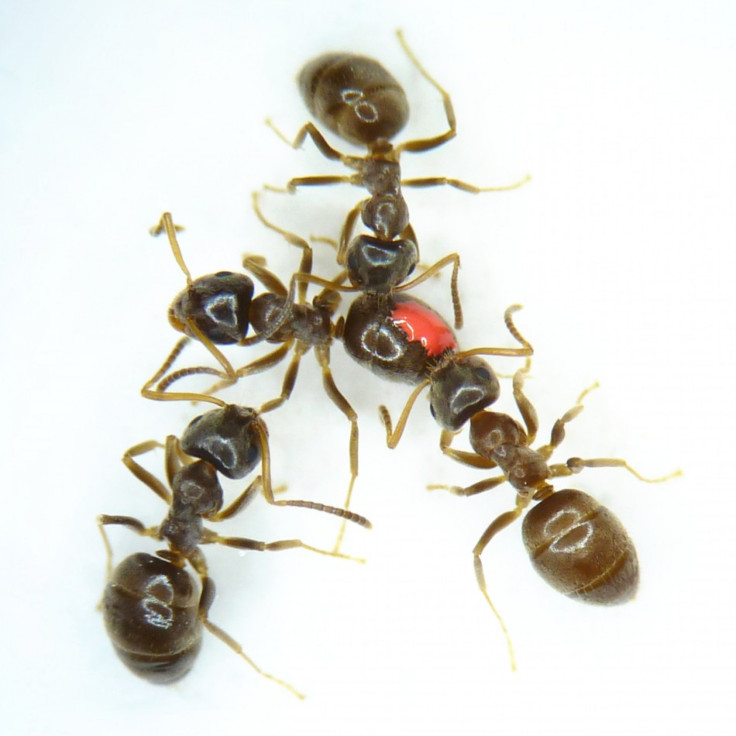Ants Lick Each Other To Fight Disease

If a friend had a fungal infection on his face, your first instinct would probably not be to lick it off of him. But for Lasius neglectus, the garden ant, swabbing fungus off a nestmate with one's tongue is actually a good strategy to keep from getting sick, and scientists are calling it social vaccination.
By grooming their sick nestmates, ants are intentionally giving themselves a weak fungal infection. This kickstarts the ant's production of anti-fungal substances, which helps ensure that they'll be able to fight off future infections, Austrian scientists reported in a paper appearing in the journal PLoS Biology on Tuesday.
Ants do not avoid sick colony members, but lick them to remove the pathogen from the exposed ant's body, Matthias Konrad of the Institute of Science and Technology Austria, the lead author of the paper, said in an email.
The researchers intentionally infected some ants with fungal spores labeled with fluorescent molecules, and then tracked the spread of the fungal infection throughout a colony. They found that ants sharing a nest with fungus-infected individuals had higher expression of two genes involved in making antifungal defenses compared to control ants.
Their findings shed light on how ants can cope with crowded living situations.
For humans and ants, living in large groups can confer lots of benefits - protection from predators, more efficient food gathering - but there's an increased risk that diseases will move quickly through the group, according to Konrad.
In order to counteract this increased threat, insect societies have evolved sophisticated collective anti-parasite defenses that combine the immune systems of all group members and their collective social hygienic behaviors - a kind of social immune system, Konrad says.
Using mathematical modeling, the scientists also discovered that social immunization likely enables colonies to recover more rapidly from an infection.
Humans discovered the benefits of intentionally infecting themselves in the late eighteenth century, when English scientist Edward Jenner found that inoculating patients with the weaker disease cowpox immunized them against deadly smallpox.
Vaccines for humans usually contain a dead or weakened bit of a disease-causing microbe so the body's immune system can recognize the microbe and prepare a defense against it in the form of antibodies.
For ants, however, the process turns out to be a little different - the fungal spores transmitted from ant to ant aren't weakened. Nor are any antibodies produced.
In general, the immune systems of insects don't work the way that human or vertebrate immune systems work, says Anna Dornhaus, a University of Arizona researcher unaffiliated with the study.
For years, scientists believed ants were not able to adapt their immune systems to fight diseases the way humans do. However, researchers have recently discovered that ants and other insects actually have a variety of sophisticated mechanisms for fighting off disease, Dornhaus said.
Many insect species react to infected colony members by isolating them. In some species of honeybee, a diseased individual will voluntarily leave the nest and take up a job collecting food for the colony.
Leaf-cutter ants, meanwhile, enforce prohibitions against potentially infected individuals to protect their cultivated fungus gardens.
These ants have a complex waste management system, in which workers transport unwanted fungi and other waste to a trash heap near the colony, and others live in the refuse pile and work turning the garbage over to facilitate decomposition. These latter full-time garbagemen are prohibited from reentering the nest and exposing the crops to any fungi or other infections they may be carrying.
But rather than isolating diseased individuals, the behavior observed by the Austrians suggests some ant colonies may take the opposite, more collaborative route to fighting infections.
© Copyright IBTimes 2024. All rights reserved.





















